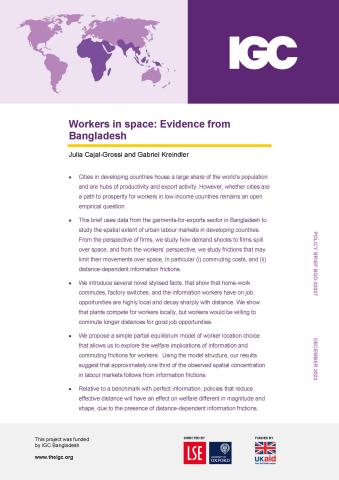-
Cajal-Grossi and Kreindler Policy brief December 2023
PDF document • 366.82 KB
- Cities in developing countries house a large share of the world’s population and are hubs of productivity and export activity. However, whether cities are a path to prosperity for workers in low-income countries remains an open empirical question.
- This brief uses data from the garments-for-exports sector in Bangladesh to study the spatial extent of urban labour markets in developing countries. From the perspective of firms, we study how demand shocks to firms spill over space, and from the workers’ perspective, we study frictions that may limit their movements over space, in particular (i) commuting costs, and (ii) distance-dependent information frictions.
- We introduce several novel stylised facts, that show that home-work commutes, factory switches, and the information workers have on job opportunities are highly local and decay sharply with distance. We show that plants compete for workers locally, but workers would be willing to commute longer distances for good job opportunities.
- We propose a simple partial equilibrium model of worker location choice that allows us to explore the welfare implications of information and commuting frictions for workers. Using the model structure, our results suggest that approximately one third of the observed spatial concentration in labour markets follows from information frictions.
- Relative to a benchmark with perfect information, policies that reduce effective distance will have an effect on welfare different in magnitude and shape, due to the presence of distance-dependent information frictions.




